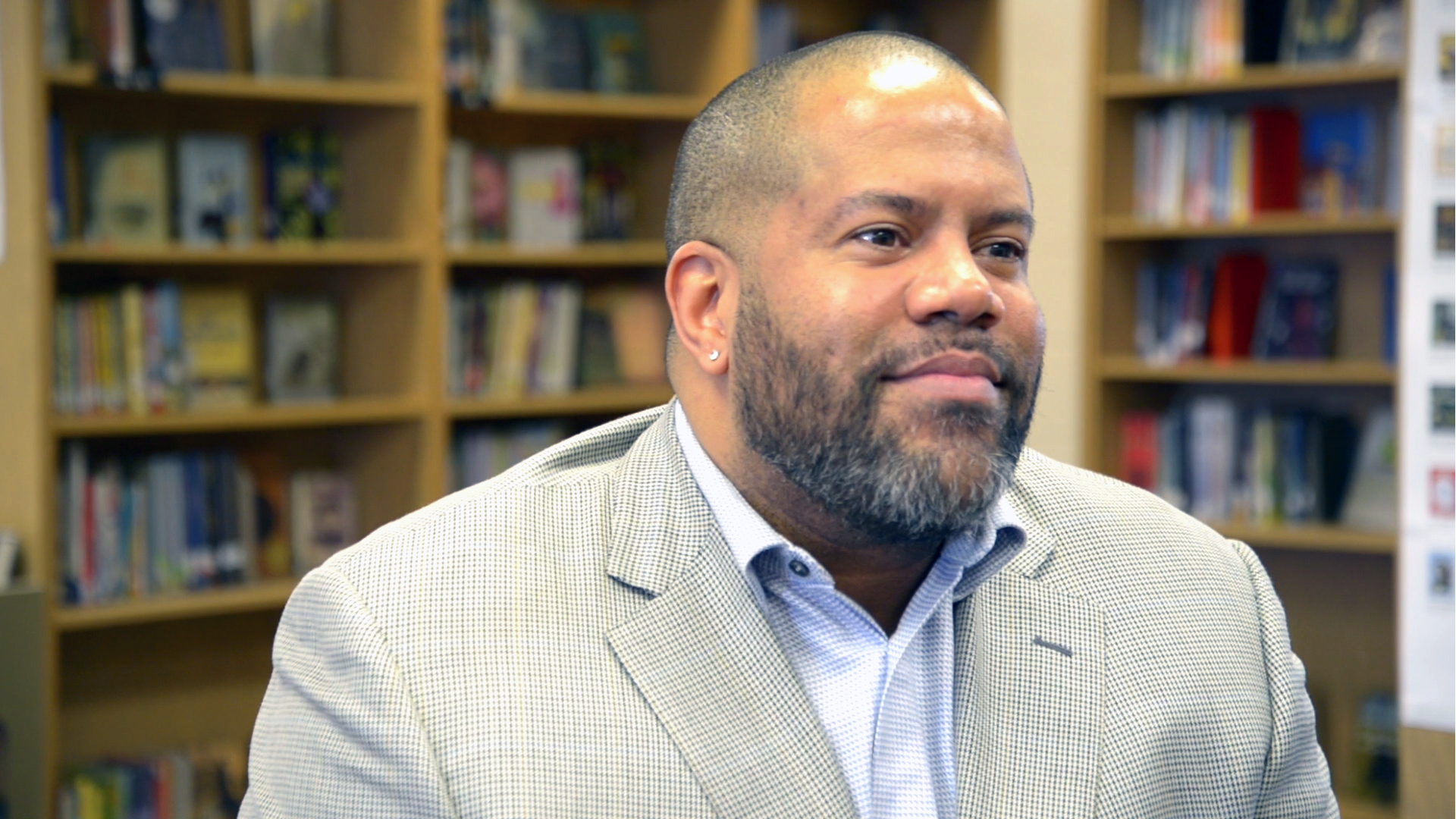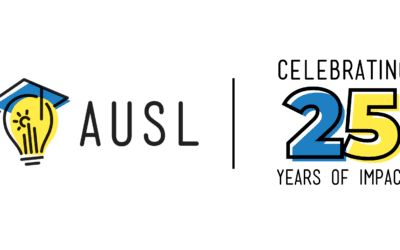[vc_row][vc_column][vc_column_text]As Director of Advisory Services, Tre Childress has worked with school districts all across the country, implementing change and helping others transform outcomes for students who need it the most and often get the least.
Join us in learning more about him, the work, and what the future holds for public education. [/vc_column_text][vc_video link=”https://youtu.be/LTxcJEHyRwg” el_width=”80″ align=”center”][vc_column_text]Q: What does AUSL Advisory Services do?
Tre: Advisory Services is AUSL’s consultancy, partnering with districts and schools to support their work in transforming the educational outcomes of their students.[/vc_column_text][vc_column_text css=”.vc_custom_1524513098442{border-top-width: 3px !important;border-right-width: 3px !important;border-bottom-width: 3px !important;border-left-width: 3px !important;padding-top: 20px !important;padding-right: 20px !important;padding-bottom: 20px !important;padding-left: 20px !important;border-left-color: #f46562 !important;border-left-style: dashed !important;border-right-color: #f46562 !important;border-right-style: dashed !important;border-top-color: #f46562 !important;border-top-style: dashed !important;border-bottom-color: #f46562 !important;border-bottom-style: dashed !important;}”]
“After years of training teachers and managing neighborhood public schools, we realized that we have gained a significant amount of knowledge regarding school improvement that we wanted to share with others. Our intended impact is to advocate for not only our students but for students across the country that are constrained to low-performing schools.” -Donald Feinstein, Ph.D., Executive Director
[/vc_column_text][vc_column_text]Q: What types of services do you provide?
Tre: We offer full day workshops (AUSL Institutes), multi-day onsite workshops, and ongoing coaching, tools, and support to improve school climate and culture, drive curriculum and instructional leadership, mitigate teacher turnover, and build a data-driven culture.[/vc_column_text][vc_row_inner content_placement=”middle”][vc_column_inner width=”1/2″][vc_column_text]Q: What makes AUSL Advisory Services different from other advisory organizations?
Tre: As a consultancy, we are different because we speak from experience from actively managing and learning from our schools. Our network consists of 31 high-needs public schools on Chicago’s West and South Sides – where you can see the practices and tools we share with our clients in action in real-time. Everyday, we see successful practitioners doing the work and helping transformation outcomes for students of color – and we want you to see and embody it too.[/vc_column_text][/vc_column_inner][vc_column_inner width=”1/2″][vc_column_text css=”.vc_custom_1524513406744{border-top-width: 3px !important;border-right-width: 3px !important;border-bottom-width: 3px !important;border-left-width: 3px !important;padding-top: 20px !important;padding-right: 20px !important;padding-bottom: 20px !important;padding-left: 20px !important;border-left-color: #6daf3d !important;border-left-style: dashed !important;border-right-color: #6daf3d !important;border-right-style: dashed !important;border-top-color: #6daf3d !important;border-top-style: dashed !important;border-bottom-color: #6daf3d !important;border-bottom-style: dashed !important;}”]
“One thing I know from my 20 years as a principal in Chicago Public Schools is that a picture is worth a thousand words. Because we actually manage schools and do the work on the ground every day, we are able to show others what we do and how it works — rather than just tell them what they should do.“-Donald Feinstein, Ph.D., Executive Director
[/vc_column_text][/vc_column_inner][/vc_row_inner][vc_column_text]Q: Describe what a typical advisory partner looks like.
Tre: Most of our clients are similar to our own schools — low-income and high-minority student populations in under-resourced schools. But we believe that the practices that we have honed in our AUSL-managed schools — around school culture and climate, data-driven decision-making, behavior management, teacher development — are applicable in some way to all schools and districts wanting to work toward excellence.[/vc_column_text][vc_column_text]Q: What are the hallmarks of your partnership approach?
Tre: The most important thing for a successful partnership is to be mission-aligned. We both have to be believe in the capacity of the students that we serve and our ability to transform the trajectory of those students. Second, relationships are key. We must work towards the same goal. This means connecting with all stakeholders so we can understand the current culture and assets of the community and mobilize all on the improvement journey.[/vc_column_text][vc_video link=”https://youtu.be/c1iZUDyGxsk” el_width=”80″ align=”center”][vc_column_text]Q: Tell us about your approach to the work.
Tre: Our approach is not a one-size-fits-all approach. Like the diversity of a classroom, so too is there diversity in the challenges, needs, and assets within each school community. We pride ourselves on our ability to tailor the work to the needs of our partners. In addition, our goal is to ensure implementation success of any and all objectives, ideas, and action plans. We want to make sure that our recommendations are in-place and working, so we always consider all of our partnerships ongoing, regardless of contract length.[/vc_column_text][vc_column_text]Q: Tell us about you and your experience in education.
Tre: My teaching career started in New Orleans, where I taught sixth grade Math and Science in a traditional public school, which served three different housing projects. After that, I was a seventh grade Math teacher at a charter school and then moved onto becoming a principal of an all-boy Catholic middle school where the focus was college preparedness.
When I came to Chicago, I taught high school Math and Science at a charter school in the North Lawndale neighborhood. From there, I left to become a founding teacher and department chair at Urban Prep Charter Academy for Young Men in Englewood. When I became the founding principal of Urban Prep’s second campus in East Garfield Park, my students ranked in the top 10% for ACT growth in the city of Chicago. And lastly, right before I started with AUSL, I was the Director of Instruction for Woodlawn Children’s Promise Community.
This is all to say — I’m a practitioner. Not only have I experienced all levels of the inner workings of schools and school systems, but I’m currently in an Educational Leadership doctoral program to further my own education. And from what I’ve seen, what AUSL has been able to do through our innovative model is incredible. [/vc_column_text][vc_column_text]Q: How have ESSA regulations impacted your work?
Tre: The Every Student Succeeds (ESSA) Act provides states with federal dollars to improve their lowest 5% of schools. Prior, schools who needed the most support in serving the most vulnerable students, did not have funds to engage external partners to provide support. Now with this act in place, dollars have been allocated to states, districts, and schools, so they can be more aggressive in finding partners of like mission and mind to work together to support better outcomes for their students. This regulation has opened the door for Advisory Services to work even more deeply across the country (we are on the approved vendor lists of Nevada, Louisiana, and, of course, Illinois with other state approvals pending).[/vc_column_text][vc_column_text]Q: What are some of the biggest concerns your clients have (or, what services are being requested)?
Tre: Climate and culture is a very common challenge. Typically, our clients ask about behavior management when they’re addressing issues about their schools’ and classrooms’ environment. They ask what routines and procedures we instill in our schools to make them a positive and safe place for teaching and learning to take place. Besides behavior, we are often engaged to support the development of a data-driven culture and how to ensure data is being used strategically for school and student improvement.[/vc_column_text][vc_column_text]Q: What does Advisory Services look like in three years? Five years?
Tre: As reflected in our mission, we truly believe that our successful approach to transforming student outcomes in what used to be low-performing schools can be implemented to address educational challenges in any community. So, in five years I hope we’re able to help even more schools across the nation to improve public education as a whole.[/vc_column_text][vc_column_text]Q: With national conversation around school violence, what are some recommendations you have to improving school safety and culture? What have you seen work really well?
Tre: What works well are when school communities are focused on knowing, understanding, and building relationships with their students. I’ve worked in high schools that didn’t have a metal detector, but the relationship between the school staff and the students was so strong, staff was able to intervene with support in cases of conflict. People are key and the relationships they form are the basis of transforming the school experience.[/vc_column_text][vc_video link=”https://youtu.be/PZuVNDcy1A8″ el_width=”80″ align=”center”][vc_column_text]Q: Do you only work with urban districts? What are some common challenges you see in rural districts?
Tre: No, we serve both urban and rural communities. One of the biggest challenges our rural partners face is attendance. This is due to their large district radius and limited transportation options. In these cases, we have worked with our district partners on connecting with parents about how to get their children to and from school. We know that some, but not all, of the challenges that rural communities face are similar to urban communities — that’s why we ensure through a thorough needs assessment that we truly understand the challenges and develop targeted solutions to meet those needs regardless of the type of community.[/vc_column_text][vc_column_text]Q: What is a common challenge you’ve faced when working with a client?
Tre: Something I encounter is the gap between what school leadership believes about their students and the true capacity of their students. Many administrators experience “initiative fatigue” and have become comfortable with how things are, regardless of what the data says about student performance. Plus, having an outsider come in and discuss their practice can make a person feel inadequate and their efforts unappreciated.
I react in two ways.
One, I don’t take it personally.
Second, I try to have a real discussion about what we want for their students. Do we want the same things? Do we believe that it is our responsibility to make sure that students are college-ready, regardless of their role or grade-level they teach? I hope to appeal to them that all students deserve a school that works well and provides high-quality education, regardless of the surrounding neighborhood, home situation, or zip code.[/vc_column_text][/vc_column][/vc_row][vc_row][vc_column width=”1/4″][stm_btn_simple btn_style=”flat” btn_link=”url:http%3A%2F%2Fwww.auslchicago.org%2Fblog%2F|||” btn_link_text=”Return to Blog”][/vc_column][vc_column width=”1/4″][stm_btn_simple btn_style=”flat” btn_link=”url:http%3A%2F%2Fwww.auslchicago.org%2Fausl-advisory-services%2F|||” btn_link_text=”Advisory Services”][/vc_column][vc_column width=”1/4″][stm_btn_simple btn_style=”flat” btn_link=”url:http%3A%2F%2Fwww.auslchicago.org%2Fdonate%2F|||” btn_link_text=”Donate”][/vc_column][vc_column width=”1/4″][stm_btn_simple btn_style=”flat” btn_link=”url:http%3A%2F%2Fwww.auslchicago.org%2Fabout%2Fimpact-through-innovation%2F|||” btn_link_text=”Innovation Zone”][/vc_column][/vc_row]
















